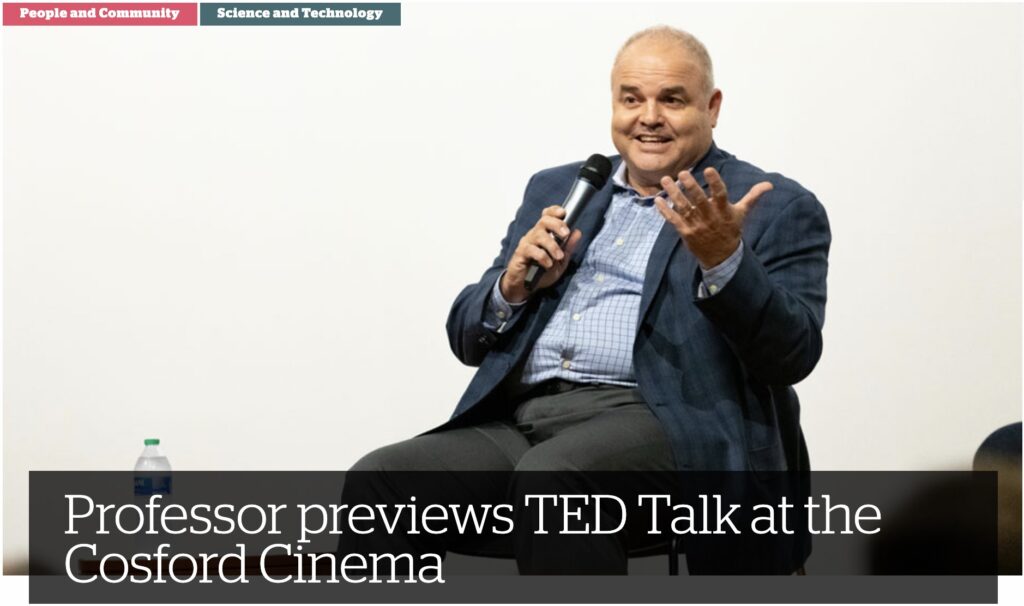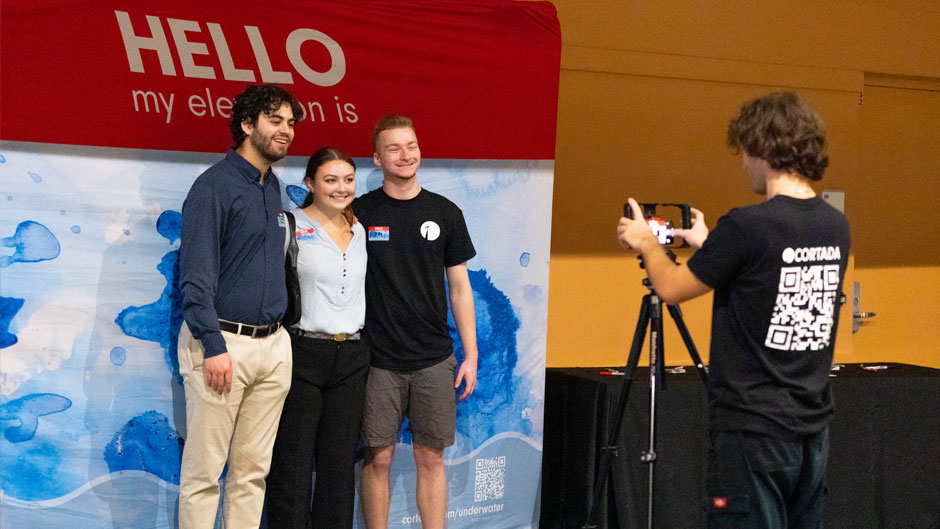

Xavier Cortada, professor of practice and three-time alumnus of the University, discussed his TED Talk and other socially engaged projects during an event held at the Cosford Cinema on Nov. 28. Photo: Jenny Hudak/University of Miami
News@TheU | November 29, 2022
JENNY HUDAK
The University of Miami community on Monday got an exclusive sneak peek of a TED Talk by Xavier Cortada, professor of practice and three-time alumnus. The event included a panel discussion about climate change impacts, research, and solutions in South Florida.
How do we best engage the public around climate issues?
It is a question Xavier Cortada, a University of Miami professor of practice and three-time alumnus, has spent his life answering through socially engaged art.
Cortada addresses the question in an upcoming TED Talk, and members of the University of Miami community got an exclusive preview of the talk during a screening on Nov. 28 at the Bill Cosford Cinema. The event included a panel discussion with University experts about climate change impacts, research, and solutions in South Florida. The event also marked the launch of Miami Art Week as part of Art Basel, which begins on Dec. 1.
To introduce the panel, Miami-Dade County Mayor Daniella Levine Cava welcomed guests and thanked Cortada for his environmental activism in South Florida. Levine Cava called on young audience members to be changemakers to combat climate change.
“We need public buy-in, and we need to welcome broad civic engagement and pressure from the residents, students, and future generations [to fight climate change],” Levine Cava said. “Climate change will affect all of you the most, and we are counting on you to be the agitators, the disruptors, and to make sure that we do not retreat from these commitments.”
The discussion was moderated by David Kelly, professor for the University of Miami Patti and Allan Herbert Business School, academic director of the sustainable business master’s degree program, and co-chair of the Sustainable Business Research Cluster. It featured Cortada alongside Sonia Chao, associate dean of research and co-director of the Master of Professional Science in urban sustainability and resilience program in the School of Architecture, and Brian Haus, professor and chair of the Department of Ocean Sciences at the University of Miami Rosenstiel School of Marine, Atmospheric, and Earth Science.
The panelists discussed their academic and research-focused approaches to climate solutions. They noted that the threat of climate change is one that people living in Miami must tackle with a comprehensive strategy that includes research, community, and passion.
Chao highlighted one of her research projects in which she and a team of researchers analyzed data, including federal insurance rate maps, land zones, and building structures, to develop a tool that would detail how buildings are at risk of sea level rise to address their specific vulnerabilities. She said that she hopes research like hers helps communities make informed decisions.
“We hope that this tool becomes a useful tool. Not only to citizens, because it allows them to understand what their reality is and to help them make choices, but it also helps those in government to make their choices. They have limited resources, and we have entrusted them to make decisions on our behalf that will best serve us as a community,” she said.
The discussion focused on how increasing awareness in the South Florida community of the threats of sea level rise is an integral part of the complex strategies that will be part of the climate crisis solution.
Cortada shared how he uses his art to inspire awareness throughout Miami.
“As an artist, I try to ensure that the broader society finds the relevance of [climate issues] at a time when it might not be obvious,” he said.
In 1984 the nonprofit TED—which stands for technology, entertainment, and design—started bringing together experts in technology, entertainment, and design for public-speaking presentations at its conference. The topics for these TED Talks grew and so did the presenters, who are usually limited to 18 minutes each. “Countdown,” TED’s climate action initiative, launched in 2019 with a focus on talks about accelerating solutions to climate change.
Cortada’s TED Talk recounts a trip to Antarctica in 2006, where he discovered how dire the climate crisis is. Inspired by his visit, Cortada turned to socially engaged art. He founded the “Underwater HOA,” an interactive art project which aims to generate awareness of rising sea levels in Miami and engage people to take action against climate change by providing a space where homeowners can address its impending impacts.
The art pieces depict South Florida’s vulnerability to sea-level rise, specifically the vulnerability homeowners within South Florida face. Using paintings made from the melting ice Cortada saw in Antarctica, local homeowners then install a “marker” in their front yard that depicts the house’s current elevation above sea level.

Ethan Rozencwaig, a senior studying ecosystem science and policy; Dale Pantone, a senior studying marine affairs; and Luke Norris, a sophomore studying ecosystem science and policy pose for a photo in front of “HELLO” photographed by Patrick Rodriguez, a Cortada Foundation intern. Photo: Jenny Hudak/University of Miami
Prior to the event, attendees were invited to take part in Cortada’s participatory art project “HELLO,” which was launched with Levine Cava in 2021, and the “Underwater HOA,” where participants could use an interactive map to see where their home lies above sea level. Visitors took nametags from the “HELLO” project and instead of identifying themselves with their names, identified how many feet above sea level they live.
Sara Hooper, a first-year student studying economics and neuroscience, and Luke Norris, a sophomore studying ecosystem science and policy, are student interns for the Xavier Cortada Foundation. Together with Cortada’s team, they work to bring his art projects to life in the community.
“I know the importance of how art can reach people in a way words can’t,” Norris said. “You know the saying ‘A picture is worth a thousand words?’ We’ve done murals and art in public places to create awareness [about climate change]. Awareness is important, but it’s really about awareness and action.”
Cortada noted that socially engaged art provides a mechanism to bring different people together over a shared challenge and gives people a sense of agency and responsibility in the climate crisis.
The event concluded with questions from the audience. Matthew Justin, a first-year student studying architecture, asked panelists about future alternatives to natural barriers, like mangroves, to reduce natural disasters. Haus discussed the advent of man-made hybrid structures with natural attachments, like coral reef or seagrass barges, to replace sea walls.
As a member of the Student Government’s ECO Agency, Justin had previously helped Cortada plant mangrove seedlings along the canal near the Miami Herbert Business School as part of the Reclamation Project. “It was super cool to come to hear what Professor Cortada had to say after meeting him at the business school,” he said.
Cortada’s TED Talk is set to premiere globally online on Dec. 15. Visit the Xavier Cortada Foundation for more information.
See original article at https://news.miami.edu/stories/2022/11/professor-previews-ted-talk-at-the-cosford-cinema.html